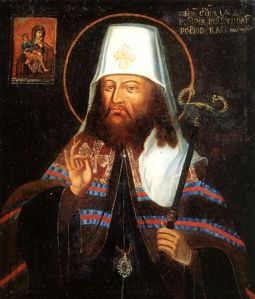 September 8th is the Feast of the Birth of the Virgin Mary
September 8th is the Feast of the Birth of the Virgin Mary
The place where the Most Blessed Virgin was born was a little town in the land of Galilee called Nazareth, which was subject to the city of Capernaum. It was inglorious and obscure, and its inhabitants were held in disdain, even as it was once said of Christ, “Can any good thing come out of Nazareth” (Jn. 1)?
But the Lord, “Who dwells on high and looks down on things that are lowly” (Ps. 112), was well pleased that His Most Pure Mother be born not in Capernaum, which in its pride was lifted up to heaven, but rather in humble Nazareth, indicating that that “which is highly esteemed among men is abomination in the sight of God” (Lk. 16), while that which is despised and disdained by them is regarded by Him as lofty and honorable.
Moreover, by its very name Nazareth hints the height of the virtues of the Most Pure Virgin. For as by His nativity in Bethlehem, which name means “House of Bread”, the Lord mystically signified that He is the Bread come down from heaven for the life and strength of men.
So by the birth of His Most Pure Mother in Nazareth He denotes sublime things. For the name “Nazareth” means a blossoming place, sacred, removed from the things of this world, adorned as it were, with a crown, and guarded. All these epithets are clearly applicable to the Most Pure Virgin, for she is the flower sprung up from the withered tree of a barren and aged womb, which has renewed our nature which has shriveled with age.
She is the flower which does not wilt, but ever blossoms with virginity. She is the most fragrant flower, giving birth to the fragrance of the only King. She is the flower which bears the Fruit which is Christ the Lord, the flower which alone has borne the fragrant Apple. She is sanctified by the grace of the Holy Spirit which has descended upon her and has overshadowed her.
She is the holiest of all the saints, as she has borne the Word, Who Himself is more holy than all the Saints. She is excluded from the ranks of the sinners of this world, for throughout her life not even once did she know sin.
All of us must say with David, “I know mine iniquity and my sin is ever before me” (Ps. 50), but she alone can say, “Without iniquity I ran, and directed my steps” (Ps. 58). She is the guide of all men, who hath not only committed no sin herself, but also turns sinners from wicked deeds, even as the Church cries out to her, “Rejoice, thou who rescuest us from the works of mire.”
Dimitri of Rostov (1651-1709; Russian Orthodox): Homily On The Nativity Of The Most Pure Theotokos; translation of complete homily @ Mystagogy.








